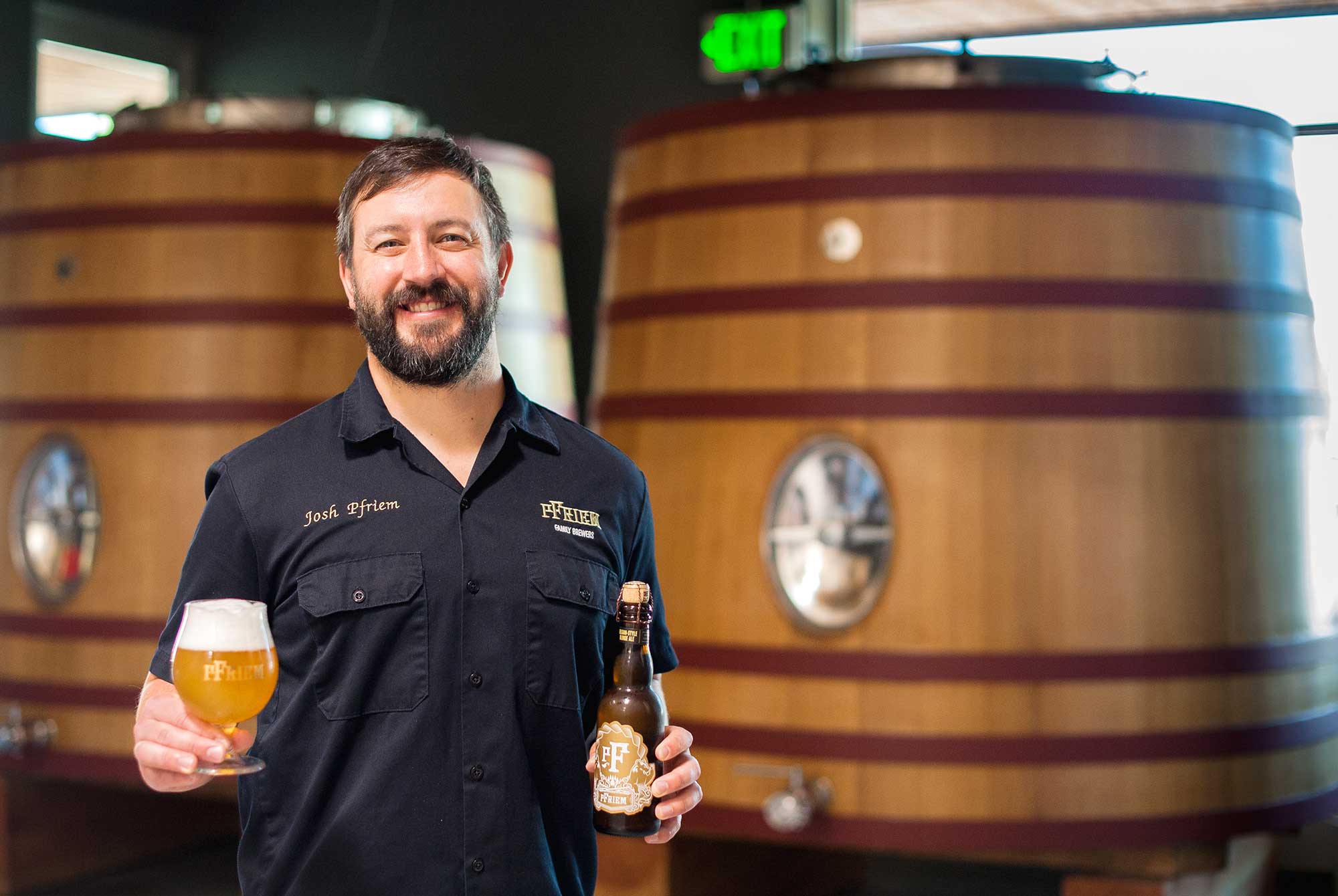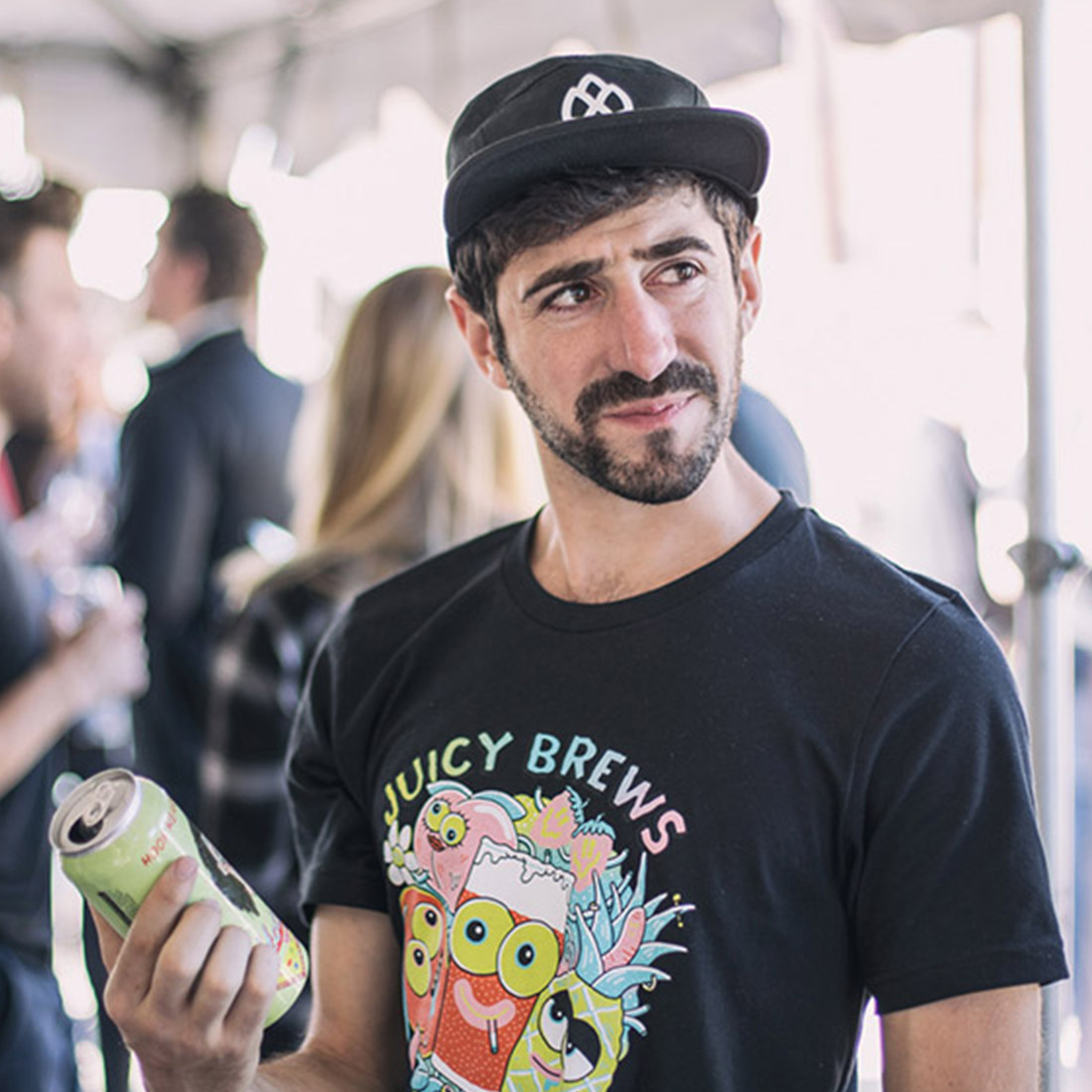Shop
An Interview with Oregon’s Lager Champion
Josh Pfriem, co-founder of pFriem Family Brewers, on making beer in Hood River, Oregon.
Tommy Lee Jones and Al Gore. Christopher Reeve and Robin Williams. Owen Wilson and Wes Anderson. Beer has its own pair of famous college roommates: Bob Kunz and Josh Pfriem.
While at Western Washington University, Kunz and Pfriem brewed their first batch of beer together. For both of them, it was a defining moment: Kunz went on to found Los Angeles-based Highland Park Brewery; Pfriem, pFriem Family Brewers in Hood River, Oregon.
We sat down with Pfriem at the Great American Beer Festival in Denver, Colorado, to talk about life, lagers, and cooperative pre-schools.
Kenny Gould: Tell me how you got started.
Josh Pfriem: In college, I fell in love with craft beer. Right after the first couple beers, I just dove into it. That same year, I started homebrewing. And after that first batch of beer, I knew I wanted to be a brewmaster and open my own brewery someday.
KG: You knew right then?
JP: Yup. I was like, this is it.
KG: I’m sure your friends were envious of your direction.
JP: Ironically, my roommate and best friend, Bob Kunz, owns Highland Park Brewery in Los Angeles, and that was his first brew as well.
KG: No way! They’re great.
JP: They’re killing it. Him and I have always had a yin and yang approach. We come at brewing from different angles and we motivate each other.
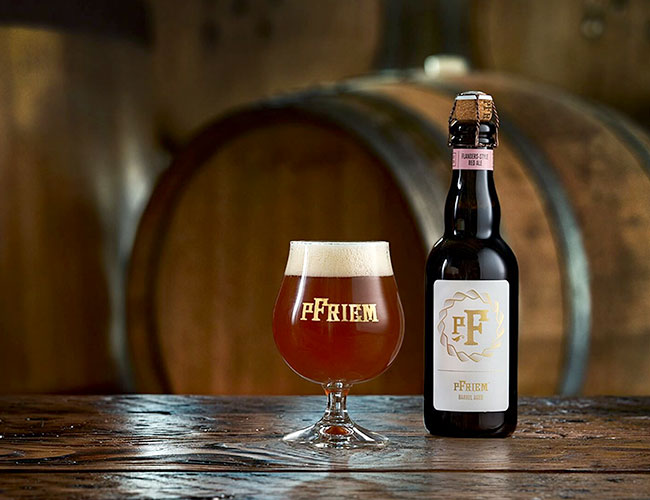
KG: What are your angles?
JP: I’m a little bit more technical, and I have a more structured background. Bob’s super creative and comes from more of a scrappy background. We meet in the middle in pursuit of quality and flavor.
KG: What were you studying in school?
JP: Business Marketing, at Western Washington University. After I graduated, I poured over brewing literature and brewing science, and kept homebrewing. I landed my first brewing job at the Utah Brewer’s Cooperative in Salt Lake. They’re the production facility for Squatters and Wasatch beer. Jennifer Talley, who just put out the Brewers Association book on session beers, was the one who pulled me into the industry. At the time, she was brewmaster of Squatters Pub. It was an awesome crew, a great group, and they’d all been brewing a long time.
What was the most important thing you learned there?
JP: I think that if you can brew high-quality 4 percent beer, you can brew anything. It wasn’t the most sexy and glamorous way to start my career, but I wouldn’t change it for anything.
KG: What happened next?
JP: Well, I wanted to get back up to the Northwest. I grew up in Seattle. I moved back up to Bellingham and brewed with Will Kemper, who’d been making beer for 30 years. Chuckanut had a focus on lagers. This was before anyone in the country was really fired up about craft lagers, maybe 2008 or 2009. From there, I moved down to Hood River to work for Full Sail. I wanted a bit of a larger brewery experience. At the time, Full Sail was contract brewing for MillerCoors, which was great because I got to work for the big guys without having to work for the big guys. I did a whole slew of things in production for them. Meanwhile, I was just test brewing in my garage and studying the business of beer.
KG: And then at some point, you decided to start pFriem.
JP: I met Ken Whiteman at our kids’ cooperative pre-school.
KG: I have to stop you there… what’s a cooperative pre-school?
JP: It has a strong focus on the teacher to parent ratio, because there’s always 2 or 3 parents in the classroom. You’re super engaged and you do tons of group activities. It’s awesome for the kids and great for the parents, who are really invested in education.
KG: Interesting. So you and Ken met?
JP: We actually met at a four-year-old’s birthday party when we were in the backyard drinking beers. We hit it off, talked about Hood River, beer, skiing, mountain biking, kiting, hiking, and he said, “Hey man, I’m going out drinking beers with my buddy tonight if you want to come along.” So I said sure. I met Rudy Kellner, my other business partner, and we cruised around town and drank beer at Full Sail and Double Mountain.
KG: What are their backgrounds?
JP: Ken comes from tech and worked in the semi-conductor world. He went to Stanford for rocket science, but left because he loved business. His first startup was when he was 28; he had a semi-conductor business out of Taiwan. Now he has a company called HitchSource.com. He loves new projects and new things.
KG: And Rudy?
JP: Rudy has run a technology called FEI, based out of Portland. The division that he ran did electron microscopes. He’s been doing that his whole career and just left FEI six months ago to come onto pFriem full time.
KG: How many people are there full time?
JP: We have 80 employees, about 55 or 60 of whom are full time. We have a busy restaurant which makes up a lot of it.
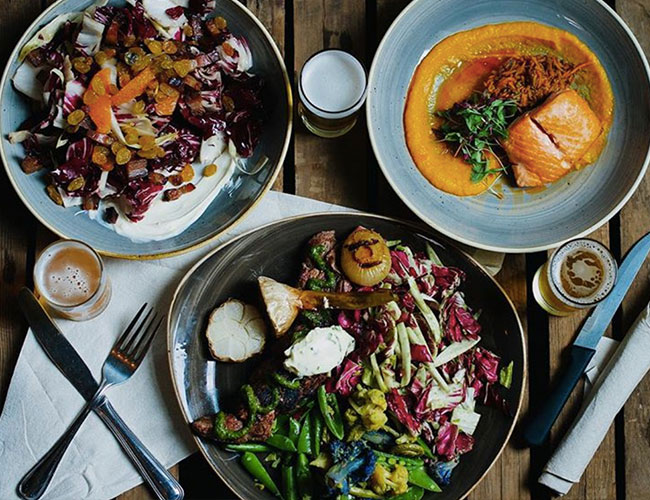
KG: Basically, you’ve been a brewer your whole life. What do you think about this new wave of breweries started by people who haven’t brewed that much, who maybe find themselves attracted to the lifestyle?
JP: I think it’s a mixed bag. Some people do it really well. Julian from Beachwood, for instance, was an engineer and a homebrewer; Gabe, his business partner, believed in him and they started a brewery. Julian is an incredibly technical, sophisticated brewer making awesome beer. He and Gabe are running a great company. They’re growing smart and well.
That’s one side and that’s awesome. On the other side, you see some boring and not-very-well put together business. It’s like, cool, you’re an engineer and you like to homebrew, but you don’t know how to put the pieces together to execute on a business. Green Cheek Brewing in Southern California is kicking ass, and they took over their space from another brewery that had that situation. They were able to take over a struggling brewery that was started by an engineer. Which is good! It’s good for the guy who had the brewery and good for Green Cheek.
This is part of the industry right now. There’s a lot of success, and people making exciting beer, and then there are a lot of mediocre beers and businesses. Beer is competitive. The last ten years have seen an ease in the market, but that’s changing.
KG: What separates the strong from the weak?
JP: In order to have a great brewery, you not only need to love great beer, but you have to have the wherewithal to make it. You have to know how to build a team. You need a team that respects you and beer. They need to want to kick ass, take names, and make great beer.
The people that are doing that, those people are being successful. You can take 10 successful business people and line them up, and all of them will have gotten to where they are from a different way. There’s not one way to get there. There are plenty of successful people doing things I wouldn’t, and vice versa. That’s the beauty of beer. But you have to have the fundamental pieces put together.
To make beer, you work with raw ingredients. It’s a capital intensive business. And then there’s the people aspect — people don’t get emotional when a tech business sells. It’s a celebration. That’s why you build it. But in beer, when people sell, people feel betrayed. They feel like every time they spend $4 or $8, they’re voting for a beer.
It’s going to be interesting to watch who continues to do that well.
KG: And what do you do well? Give me the pFriem ethos.
JP: When we started, we built the company on quality. Even in 2011, when we first started building the company, there was plenty of beer out there. I thought we’d be successful if we could bring a unique, high quality product to market. If that hadn’t been done in the area where we were at, there’d be room. If it had been done, there wouldn’t be a need; I’d just enjoy that other person’s beer and figure out something else to do. We decided to do everything we could to make the best beer possible, and we wanted everything the beer touched to hold up to that.
With our employees, we have a family-like culture. Our tasting room is unique and is open to the brewery; we have amazing food that reflects the beer. The relationships we have in the industry and with the consumers need to be at the highest quality. I wake up every morning with that thought in my mind, and we always finish the day knowing that as hard as we worked today, we’re going to work harder tomorrow to make the beer even better.
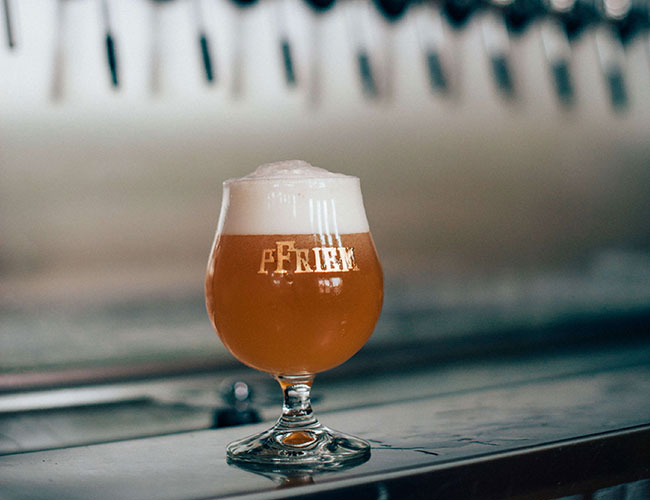
KG: So the best quality beer comes from the ingredients?
JP: Ingredients are one thing, but it’s the ethos of the beer. It’s the soul and structure of the beer — how it rests on your palate, how it appeals visually, how it pulls you in. It’s also how you experience it: the packaging, the tasting room, the service. Those things build quality. Of course, the process side is important. We’ll produce about 17,000 barrels this year, and we have a very sophisticated small brewery. Every dollar we’ve made, we’ve put back into the brewery. It’s a dynamic thing, but a multi-faceted thing. We have meetings throughout the week with the quality and production team. We have a research development meeting about changing recipes. We don’t live by the old school philosophy that says, “We’re going to make this beer in 1987 and in 2017 it’s going to taste like it does back then.” We’re the exact opposite. pFriem IPA and pFriem pilsener are our two flagships. If you had a beer time machine and you went back to when they were first brewed, they were solid beers, but they’re different than they are now. We have no problem changing beers to make them better, which I think is also really important. We have sensory; you have to drink your beer and analyze it in a critical way. You do that week over week over week and your beer gets better.
KG: How did you get your name?
JP: When we branded what is now pFriem, we put a lot of time and energy into it. This was six years ago, but it was already getting pretty noisy in the marketplace and a lot of names were taken. But we realized that sometimes, something that’s old becomes new again, and when we looked at who we are and what we wanted to do, we were inspired by Belgian and German beer culture. More generally, we were inspired by the European culture of food, beverage, and family. There was a place and time when almost all breweries were named after the founding brewer. My heritage is German and my last name is very German, so we decided to brand it “pFriem” as a commitment to quality.
KG: You put your name on it, it better be good.
JP: Exactly. We also wanted to say that we’re not a fad brewery; we’re going to be here for a long time. And we wanted to make a family business. I don’t know if my kids want to be in the beer business or not — you never want to force your kids — but maybe the opportunity can be there for them or future employees. But my business partners have kids around the same age, and we make a lot of our decisions around family. We could go harder or faster, but our line is our families. That rejuvenates us and helps us become better at what we do as businessmen and brewers.
KG: Do you have a favorite beer that you make?
JP: We’re going to make 110 different beers this year. But beers are like children — you love them all, but they all have their time and place.
KG: Right, but… you have a favorite.
JP: I do. The heart of the brewery is pFriem pilsner. That’s our baby. For all of us, it’s like our desert island beer. We drink a lot of it, we love it, and we’re very proud of it. It’s our most awarded beer. And it sets the tone and pace for everything else we do. It’s pretty awesome to be in Oregon and to have our flagship beer be a lager.
KG: Do you think lagers are becoming more popular as we move forward?
JP: I think they’re kind of the final frontier. It’s like we were talking about with the name — what’s old is becoming new again. I was just over in Europe for about 10 days and crushing Helles Lager in Munich is a beautiful thing. It’s interesting — if you look at a Helles Lager in Munich, and you look at a Budweiser, they don’t look that different, at least from afar. Taste-wise, if you know beer, they’re very different. The whole craft revolution came about to defy the industrial lagers. So it went all the way to the other side, but as we’ve become more refined and made our beers cleaner, people started to fall in love with lager. You might not drink them exclusively, but they’re very complex, very drinkable, they’re magically 5 percent or so in alcohol, and you could drink a lot of them and they still hold on the palate. I don’t think it’s a coincidence that Mexican lagers — even industrial Mexican lagers — are the fastest growing category in beer. But they’re hard to make. In order to make a sophisticated lager, you need to know what you’re doing, and it helps to have some nice equipment. But I hope the diversity continues. You spend a week in Germany and have all the lagers, and then it’s super fun to go to Brussels and get that wide diversity. The hope is that lagers continue to grow but diversity stays.

